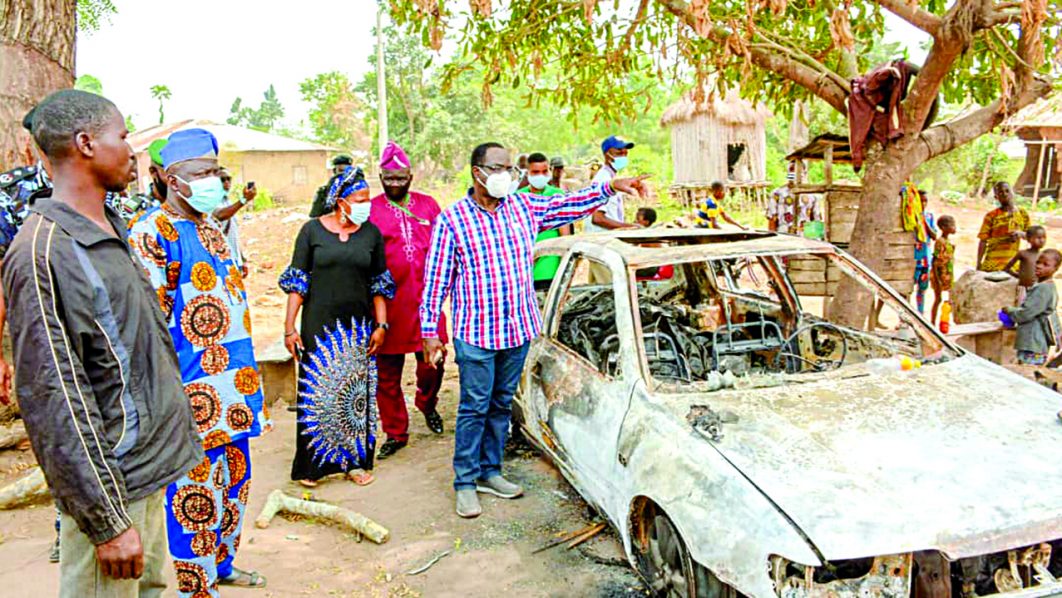
In the midst of the national malady, Ogun State has also had its ugly share. In recent weeks, some parts of Yewa axis of the state have experienced deadly attacks, allegedly carried out by armed Fulani herdsmen. The natives also reportedly fought back.
Several people have lost their lives in the mayhem, while some others sustained injuries. Houses, vehicles, motorcycles and other valuables were also razed. Mostly affected are villages within the Ketu communities, which share a border with the Republic of Benin. In Eggua, Oja-Odan, Igan Alade, Gbokoto and Ijoun, Owode-Ketu, Ebutu Igbooro, Imeko Afon and other affected areas, tension has since built up.
However, the timely intervention of Ogun State Governor, Prince Dapo Abiodun, appeared to have staved off what could have been a disastrous bloodbath in the state. Despite the subtle attempt in some quarters to politicise the security challenges and spew convoluted narratives, the Abiodun-led administration is leaving no stone unturned in putting an end to the incessant feud between herders and farmers in his domain.
In furtherance of his commitment, the Governor, last Tuesday, deployed 10 patrol vans and 20 motorcycles in the Yewa axis of the state to check the herders/farmers’ crisis in the area. The deployment was a follow-up to the Joint Special Security Intervention Squad constituted shortly after the crisis broke out.
At the presentation ceremony held in Abeokuta, the state capital, Abiodun said the measure was a fulfilment of his promise to return peace to the areas affected by the herders/farmers’ crisis in the Yewa axis. He recalled how he sent a high-powered government delegation to mediate between the two parties, when the crisis broke out a few weeks back, and his promise to support the task force with operational equipment and other necessary logistics. He, therefore, said the presentation of the equipment was a step in making good his promise to support the task force for the success of its assignment.
Abiodun noted that the people of the areas, who live close to the border area of the Republic of Benin, usually had difficulties making distress calls in times of trouble. He explained that the state government had ben having a series of meetings with telecommunication firms, adding that plans were underway to deploy more masts to the areas towards improving communication.
The governor pointed out that the vehicles and motorcycles were meant only for the Yewa axis, saying the same measure would be replicated in other parts of the state if the need arises. Noting that Ogun State was widely known for peace, Abiodun assured that his administration would ensure that anyone found sponsoring or perpetrating crime in the state would be severely dealt with.
He advised people of the state to stop ascribing crime to a particular ethnic group, saying, “A criminal is a criminal, regardless of where he comes from.”
The governor observed that the proliferation of fake news had also contributed to escalating the herders/farmers crisis in the area. He described as falsehood reports that no fewer than 5,000 indigenes of the state had escaped seeking refuge in the Republic of Benin because of the crisis.
Abiodun said: “I wonder who took the census and how that can take place without meetings between Nigeria and the Republic of Benin. Some who came to Abeokuta because of the crisis were provided with free accommodation and so, I wonder why some people would just sit down somewhere and be cooking up untrue stories.”
The Governor disclosed that the state Ministry of Justice had been saddled with the task of ensuring that there were necessary laws to provide for punitive measures against publishers of fake news.
In his remarks, the state Commissioner of Police, Edward Ajogun, thanked the Governor for fulfilling his promise. He said the measure was a warning signal to perpetrators of violence that hard times await them.
Ajogun assured that all security agencies in the state were committed to restoring peace to the troubled spots, and would do everything within the ambit of the law to achieve the objectives of the task force.
There is no gainsaying that violent clashes between herders from northern Nigeria and farmers in the southern zones have exacerbated ethnic differences in the country in recent years and threatened national security and stability.
Faced by drought and desertification, insecurity across the Sahelian belt and the loss of grazing land in traditional territories, herders have migrated southward in search of pastures and water for their cattle and consequently engaged in a dangerous struggle over land with local farmers. As they increase in frequency and intensity, these conflicts have claimed thousands of lives and worsened humanitarian and economic crises.
Tens of thousands more have been displaced, while properties, crops and livestock worth billions of naira have also been destroyed in the protracted strife. Access to illicit and smuggled firearms has further deepened the crisis.
While the crisis appeared to be driving the country on the cliff, the Abiodun-led government in Ogun State commenced the process of finding a lasting solution to the farmer-herder crisis in the state. The process first started with a peace mission; a government delegation comprising top officials and representatives of security agencies was sent to the affected areas. It was themed “confidence-building mission.”
Speaking at the palace of the Olu of Ilaro and Paramount Ruler of Yewaland, the state Commissioner for Local Government and Chieftaincy Affairs, Hon. Afolabi Afuape, who was part of the government delegation, said there was a need for peaceful coexistence in the state.
Afuape noted that though the farmer-herder crisis was a national problem, the state government was looking at ways of finding an enduring solution to it, as the incumbent administration was not happy with recent happenings in some parts of the state.
He said: “We have come on the instruction of the State Governor, Prince Dapo Abiodun to see what can be done to address this crisis. I must stress the need for peaceful co-existence among all our people, irrespective of where you come from. Though this crisis is a national issue, the Government is putting security plans in place to secure the lives of our people in this area.”
The commissioner stressed the need for the people to be vigilant by reporting strange faces and movements to security officials.
Also speaking, the state Commissioner for Information and Strategy, Alhaji Abdulwaheed Odusile, appealed to the people not to take laws into their hands, but rather allow the security agencies and the traditional rulers to handle any ugly situation.
While restating the imperative of peaceful co-existence among indigenes and residents from other ethnic groups, Odusile hinted that an all-inclusive stakeholders meeting was scheduled to hold to find solutions to the problems.
The commissioner appreciated the royal fathers in the area for dousing the tension that arose, due to the attacks from suspected herdsmen, calling for the sharing of the necessary information that would lead to the end of the crisis.
The Special Assistant to the Governor on Inter-Ethnic Affairs, Prince Hadi Sani, who spoke in Hausa and Yoruba languages, pleaded with the people to be peaceful, as no meaningful development could take place in a violence-ridden environment.
On his part, the Special Adviser to the Governor on Security, Sola Subair, a retired Assistant Inspector-General of Police, said a Joint Security Task Force would be stationed in the affected areas, just as he informed that the Amotekun Corp would soon come into being.
In his remarks, the Olu of Ilaro and Paramount Ruler of Yewaland, Oba Kehinde Olugbenle, acknowledged similar challenges in other parts of the country but added that it was becoming pronounced in the state in recent times. The monarch called for immediate setting up of the Amotekun Corps in the state, while also advocating the involvement of traditional rulers in the selection of the corps’ operatives.
“The State Governor has done well by putting in place a mechanism to address this problem. I want to plead with the Governor to commission the Amotekun Corps. When doing this, all critical stakeholders, including the traditional rulers, should be involved in recommending people who know the terrain. Round pegs should be put in round holes,” Oba Olugbenle said.
The monarch, who called for the meeting of all traditional rulers to discuss the issue, suggested the inscription of owners’ names on each cattle, arguing that this would help in identifying the owners in the event of destruction of farms by cattle.
Speaking in his palace, the Eselu of Iselu, Oba Ebenezer Akinyemi, traced the crisis to cattle feeding on farmers’ produce. He, therefore, called for the creation of special areas for herders to graze their cattle.
He also called for the rehabilitation of schools in the area to attract more children, saying that the number of out-of-school children was increasing in the area.
In the course of the visit, the delegation had a town hall meeting with the people of Oja Odan and also addressed the people at Ibeshe and Ilaro Garage, as well as the Hausa community at Dangote Cement Factory at Ibeshe and Kara, Abeokuta, where they appealed for calm and support in finding amicable solutions to the crisis.
The member representing Yewa North II State Constituency, Hon. Haruna Egungbohun, who lauded Abiodun’s efforts towards combating the menace of killer herdsmen, stressed the need to beef up security in the axis to prevent further loss of lives. However, some of the indigenes, who spoke at the meeting, called for the protection of farmers and their produce in the areas, assuring that they were ready to live in peace with their neighbours.
Immediately after the “confidence-building mission” carried out its assignment, the Governor followed up by leading top government functionaries and security chiefs for an on-the-spot assessment of the affected areas. During his visit, he informed that a stakeholders’ forum, aimed at finding lasting solutions to the farmers-herders clashes, would hold with some northern governors in attendance.
“This forum will have the representatives of all areas affected by this violence and some of the people who have been living with us for so many years. There will be representatives from outside the state. It is our hope and desire that at the end of the forum, we will find a common ground on how to live peacefully,” Abiodun told his audience, including monarchs of the affected areas.
While denouncing violence in any form, the Governor noted that the state has been a haven to people from other ethnic groups and foreigners. He condemned the activities of people who come to stoke violence and sow seeds of discord among residents. He assured that the government would settle the hospital bills of the injured and compensate those who lost their properties and means of livelihood during the crisis.
During his visit, the Governor stated that the planned task force would be made up of personnel from the military, police, Nigeria Security and Civil Defence Corps, Department of State Services (DSS) and local hunters, among others, to patrol the areas and restore confidence among residents.
At the Obas Complex, Oke-Mosan, Abeokuta, a stakeholders’ parley on farmer-herder conflict was convened as promised by Governor Abiodun. At the event, Northern Governors, including Atiku Bagudu (Kebbi), Abdullahi Ganduje (Kano), Abubakar Sani Bello (Niger) and Bello Matawalle (Zamfara) were in attendance. Also present was Governor Rotimi Akeredolu of Ondo State, who is the Chairman, South-West Governors’ Forum.
Abiodun, while speaking at the parley, said it had become worrisome that people who had co-existed peacefully for years are suddenly at each other’s throat on account of sources of livelihood. He stated that it was time urgent and pragmatic steps were taken in settling the farmer-herder conflict to forestall it from snowballing into an unstoppable crisis.
His words: “From time immemorial, herders and farmers have peacefully cohabited and have continued to find joint solutions to their mutual challenges, occasional frictions and misunderstandings, while sorting these differences amicably.
“Our first priority in Ogun State is the safety of lives and property of everyone in our dear State, irrespective of the circumstances of their birth or religious leaning. Let me restate that we will not compromise.
“There is a need for collective action among all of us, whether as native farmers; cattle owners; herders; local community leaders and security agents, among others, to rid our dear state of these criminals.
“We must use the opportunity of this parley to tell ourselves the truth, not necessarily by apportioning blame. But definitely, we must come up with more practical and viable recommendations that will further cement the peaceful coexistence that we have always had in Ogun State.”
On his part, Ganduje attributed the farmer-herder clashes to encroachment, poor education and poverty among the herders, among other factors, and called for the stoppage of the practice of moving cattle from the North to the south.
The Kano Governor described the crisis as an economic issue that is turning tribal and religious, urging the Federal Government to assist herders transit from pastoral to modern ranching.
Speaking in the same vein, Governor Sanni of Niger State called for sincere actions to address the problem before it takes a new twist, noting that the setting up of ranches was the best way to stop the crisis.
Matawalle recalled the activities of bandits in his state, regretting the loss of lives and destruction of property from their attacks in Zamfara.
For Governor Bagudu, who is also the Chairman of Progressive Governors’ Forum, Nigerians have a right to live in any part of the country. He, however, said there must be ways of identifying herders and regulating their activities for peaceful co-existence.
Akeredolu called for a situation where the herders would stay in their respective states and allow those who need their cattle to come and buy from them. He said the steps taken by South West Governors were not targeted at any group, but an attempt to prevent insurgency in the region. He enjoined the leadership of Miyetti Allah to expose suspected criminals among them, so as not to give their association a bad name.
The Awujale of Ijebuland, who is also the Chairman, Ogun State Council of Obas, Oba Sikiru Kayode Adetona, said traditional rulers in the state were in support of every step taken by the government in solving the crisis.
The President, Miyetti Allah Cattle Breeders Association of Nigeria (MACBAN), Mohammed Kiriwa, represented by the National Secretary, Uthman Ngelxema, noted that the crisis was caused by foreign herders, as their Nigerian counterparts have always lived in peace with host communities, while the State Chairman of All Farmers Association of Nigeria (AFAN), Chief Segun Dasaolu, revealed that there has been a strong collaboration with some herders who had lived in the South West for more than 200 years. He declared that it was time to combine forces to tackle the menace.
Rounding off discussions, Governor Abiodun said the Federal Government needed to take a second look at the ECOWAS treaty, as it was meant for people and not the cattle movement. He maintained that a treaty was expected to be signed between the herders and the state government on what had been discussed and agreed upon.
As part of measures to end the crisis, the state government inaugurated a 20-man Peace Committee on Farmer-Herder Conflict headed by a former House of Representatives member, Kayode Oladele. The committee has since swung into action to engender peaceful coexistence, just as the state government has embarked on the distribution of palliatives to victims to cushion the effects of the crisis.
Impressed by the approach employed by Ogun State, President Muhammadu Buhari recommended the model for others facing similar skirmishes, when Governor Abiodun briefed him at the Aso Villa recently.






